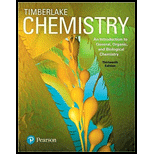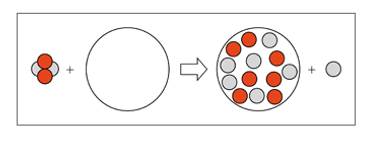
Chemistry: An Introduction to General, Organic, and Biological Chemistry (13th Edition)
13th Edition
ISBN: 9780134421353
Author: Karen C. Timberlake
Publisher: PEARSON
expand_more
expand_more
format_list_bulleted
Concept explainers
Textbook Question
Chapter 5, Problem 5.53UTC

5.53 Draw the nucleus of the isotope that is bombarded in the following: (5.2)

Expert Solution & Answer
Trending nowThis is a popular solution!

Students have asked these similar questions
Using the equation below, what is the rate of this reaction if the rate of disappearance of H2 is 0.44 M/sec?
H2 + Br2 → 2HBr
2Fe3+(aq) + Sn2+(aq) □ 2Fe²+(aq) + Sn 4+ (aq)
If the change in Sn²+ concentration is 0.0010M in 38.5 seconds, what is the rate of disappearance of
Sn²+?
For a neutral hydrogen atom with an electron in the n = 4 state, how many different energies
are possible when a photon is emitted?
4
3
2
1
There are infinite possibilities
Chapter 5 Solutions
Chemistry: An Introduction to General, Organic, and Biological Chemistry (13th Edition)
Ch. 5.1 - Prob. 5.1PPCh. 5.1 - Prob. 5.2PPCh. 5.1 - Naturally occurring potassium consists of three...Ch. 5.1 - Naturally occurring iodine is iodine-127....Ch. 5.1 - Identify each of the following: a. 10X b. 24X c....Ch. 5.1 - Identify each of the following: a. 11X b. 3581X c....Ch. 5.1 - Prob. 5.7PPCh. 5.1 - Prob. 5.8PPCh. 5.1 - Prob. 5.9PPCh. 5.1 - Prob. 5.10PP
Ch. 5.1 - Prob. 5.11PPCh. 5.1 - Prob. 5.12PPCh. 5.2 - Prob. 5.13PPCh. 5.2 - Prob. 5.14PPCh. 5.2 - Prob. 5.15PPCh. 5.2 - Prob. 5.16PPCh. 5.2 - Prob. 5.17PPCh. 5.2 - Prob. 5.18PPCh. 5.2 - Prob. 5.19PPCh. 5.2 - Prob. 5.20PPCh. 5.2 - Complete each of the following reactions: a....Ch. 5.2 - Prob. 5.22PPCh. 5.3 - Prob. 5.23PPCh. 5.3 - Prob. 5.24PPCh. 5.3 - Prob. 5.25PPCh. 5.3 - Prob. 5.26PPCh. 5.3 - Prob. 5.27PPCh. 5.3 - Prob. 5.28PPCh. 5.4 - Prob. 5.29PPCh. 5.4 - Prob. 5.30PPCh. 5.4 - Prob. 5.31PPCh. 5.4 - Prob. 5.32PPCh. 5.4 - Prob. 5.33PPCh. 5.4 - Prob. 5.34PPCh. 5.5 - Prob. 5.35PPCh. 5.5 - Prob. 5.36PPCh. 5.5 - Prob. 5.37PPCh. 5.5 - Prob. 5.38PPCh. 5.5 - Prob. 5.39PPCh. 5.5 - Prob. 5.40PPCh. 5.6 - Prob. 5.41PPCh. 5.6 - Prob. 5.42PPCh. 5.6 - Prob. 5.43PPCh. 5.6 - Prob. 5.44PPCh. 5.6 - Prob. 5.45PPCh. 5.6 - Prob. 5.46PPCh. 5.6 - Prob. 5.47PPCh. 5.6 - Prob. 5.48PPCh. 5.6 - Prob. 5.49PPCh. 5.6 - Prob. 5.50PPCh. 5 - Prob. 5.51UTCCh. 5 - Prob. 5.52UTCCh. 5 - 5.53 Draw the nucleus of the isotope that is...Ch. 5 - Prob. 5.54UTCCh. 5 - Prob. 5.55UTCCh. 5 - Prob. 5.56UTCCh. 5 - Determine the number of protons and number of...Ch. 5 - Determine the number of protons and number of...Ch. 5 - Prob. 5.59APPCh. 5 - Prob. 5.60APPCh. 5 - Prob. 5.61APPCh. 5 - Prob. 5.62APPCh. 5 - Prob. 5.63APPCh. 5 - Prob. 5.64APPCh. 5 - Prob. 5.65APPCh. 5 - Prob. 5.66APPCh. 5 - Prob. 5.67APPCh. 5 - Prob. 5.68APPCh. 5 - Prob. 5.69APPCh. 5 - Prob. 5.70APPCh. 5 - Where does fusion occur naturally? (5.6)Ch. 5 - Prob. 5.72APPCh. 5 - Prob. 5.73APPCh. 5 - Prob. 5.74APPCh. 5 - Prob. 5.75APPCh. 5 - Prob. 5.76APPCh. 5 - Prob. 5.77APPCh. 5 - Prob. 5.78APPCh. 5 - Prob. 5.79CPCh. 5 - Prob. 5.80CPCh. 5 - Prob. 5.81CPCh. 5 - Prob. 5.82CPCh. 5 - Prob. 5.83CPCh. 5 - Prob. 5.84CPCh. 5 - Prob. 5.85CPCh. 5 - Prob. 5.86CPCh. 5 - Prob. 5.87CPCh. 5 - Prob. 5.88CPCh. 5 - Prob. 5.89CPCh. 5 - Prob. 5.90CP
Knowledge Booster
Learn more about
Need a deep-dive on the concept behind this application? Look no further. Learn more about this topic, chemistry and related others by exploring similar questions and additional content below.Similar questions
- 2 NO(g) + H2(g) → N2(g) +2 H2O(g) If NO has rate of disappearance of 0.025 M/min, what is the rate of this reaction?arrow_forward2Fe3+(aq) + Sn2+(aq) □ 2Fe²+(aq) + Sn 4+ (aq) If the change in Sn2+ concentration is 0.0010M in 38.5 seconds, what is the rate of appearance of Fe²+?arrow_forwardUsing the equation below, if the rate of disappearance of Cl2 is 0.26 M/min, what is the rate of this reaction? 2NO(g) + Cl2(g) → 2NOCI(g)arrow_forward
- A 45.0 mL solution containing a mixture of 0.0634 M KCN and 0.0634 M KCI is titrated with 0.107 M AgNO. From this mixture, which silver salt will precipitate first? A list of Ksp values can be found in the table of solubility constants. • AgCI • not enough information to determine AgCN What is the concentration of Ag* at the first equivalence point? [Ag*] = Will the second silver salt begin to precipitate at the first equivalence point before the first silver salt has completely precipitated? • not enough information to determine • yes • noarrow_forward[Review Topics] [References] Indicate whether the pair of structures shown represent stereoisomers, constitutional isomers, different conformations of the same compound, or the same conformation of a compound viewed from a different perspective. Note that cis, trans isomers are an example of stereoisomers. H₂N ✓ CI H₂N NH2 NH₂ CI Submit Answer Retry Entire Group 2 more group attempts remaining Previous Next>arrow_forwardDon't used Ai solutionarrow_forward
- Draw resonance structures for the following compounds. Please provide a thorough explanation that allows for undertanding of topic.arrow_forwardBF3 has a no dipole moment. a) Draw the Lewis structure for BF3, showing all nonbonding electrons. b) Indicate the polarity of every atom in the structure using δ+ and δ– notation, and explain why the molecule has no net dipole. Please provide a thorough explanation that allows for undertanding of topic.arrow_forwardFor each reaction shown below follow the curved arrows to complete each equation by showing the structure of the products. Identify the acid, the base, the conjugated acid and conjugated base. Consutl a pKa table and choose the direciton the equilibrium goes. Please provide a thorough explanation that allows for undertanding of topic.arrow_forward
- Need help understanding please help Let’s assume the initial volume of the gas is 4.80 LL , the initial temperature of the gas is 29.0 °C°C , and the system is in equilibrium with an external pressure of 1.2 bar (given by the sum of a 1 bar atmospheric pressure and a 0.2 bar pressure due to a brick that rests on top of the piston). What is the final pressure of the gas? What is the final volume of the gas? What happens with the piston after you finish heating the gas? Assume you do not need to worry about the gas cooling down again because the outside of the container is at a lower temperature. That is, you manage to keep the gas at a constant temperature that equals 54.2 °C°C What is the sign of w? What is the value of w? Be careful with units. How do you convert bar*L to J?arrow_forwardFor a neutral hydrogen atom with an electron in the n = 4 state, how many different energies are possible when a photon is emitted?arrow_forwardFor the following compound identify the lone pairs and indicate if each lone pair is localized or delocalized. Please provide a thorough explanation that allows for undertanding of topic.arrow_forward
arrow_back_ios
SEE MORE QUESTIONS
arrow_forward_ios
Recommended textbooks for you
 ChemistryChemistryISBN:9781305957404Author:Steven S. Zumdahl, Susan A. Zumdahl, Donald J. DeCostePublisher:Cengage Learning
ChemistryChemistryISBN:9781305957404Author:Steven S. Zumdahl, Susan A. Zumdahl, Donald J. DeCostePublisher:Cengage Learning ChemistryChemistryISBN:9781259911156Author:Raymond Chang Dr., Jason Overby ProfessorPublisher:McGraw-Hill Education
ChemistryChemistryISBN:9781259911156Author:Raymond Chang Dr., Jason Overby ProfessorPublisher:McGraw-Hill Education Principles of Instrumental AnalysisChemistryISBN:9781305577213Author:Douglas A. Skoog, F. James Holler, Stanley R. CrouchPublisher:Cengage Learning
Principles of Instrumental AnalysisChemistryISBN:9781305577213Author:Douglas A. Skoog, F. James Holler, Stanley R. CrouchPublisher:Cengage Learning Organic ChemistryChemistryISBN:9780078021558Author:Janice Gorzynski Smith Dr.Publisher:McGraw-Hill Education
Organic ChemistryChemistryISBN:9780078021558Author:Janice Gorzynski Smith Dr.Publisher:McGraw-Hill Education Chemistry: Principles and ReactionsChemistryISBN:9781305079373Author:William L. Masterton, Cecile N. HurleyPublisher:Cengage Learning
Chemistry: Principles and ReactionsChemistryISBN:9781305079373Author:William L. Masterton, Cecile N. HurleyPublisher:Cengage Learning Elementary Principles of Chemical Processes, Bind...ChemistryISBN:9781118431221Author:Richard M. Felder, Ronald W. Rousseau, Lisa G. BullardPublisher:WILEY
Elementary Principles of Chemical Processes, Bind...ChemistryISBN:9781118431221Author:Richard M. Felder, Ronald W. Rousseau, Lisa G. BullardPublisher:WILEY

Chemistry
Chemistry
ISBN:9781305957404
Author:Steven S. Zumdahl, Susan A. Zumdahl, Donald J. DeCoste
Publisher:Cengage Learning

Chemistry
Chemistry
ISBN:9781259911156
Author:Raymond Chang Dr., Jason Overby Professor
Publisher:McGraw-Hill Education

Principles of Instrumental Analysis
Chemistry
ISBN:9781305577213
Author:Douglas A. Skoog, F. James Holler, Stanley R. Crouch
Publisher:Cengage Learning

Organic Chemistry
Chemistry
ISBN:9780078021558
Author:Janice Gorzynski Smith Dr.
Publisher:McGraw-Hill Education

Chemistry: Principles and Reactions
Chemistry
ISBN:9781305079373
Author:William L. Masterton, Cecile N. Hurley
Publisher:Cengage Learning

Elementary Principles of Chemical Processes, Bind...
Chemistry
ISBN:9781118431221
Author:Richard M. Felder, Ronald W. Rousseau, Lisa G. Bullard
Publisher:WILEY
Atomic Number, Atomic Mass, and the Atomic Structure | How to Pass ChemistryThe Nucleus: Crash Course Chemistry #1; Author: Crash Course;https://www.youtube.com/watch?v=FSyAehMdpyI;License: Standard YouTube License, CC-BY